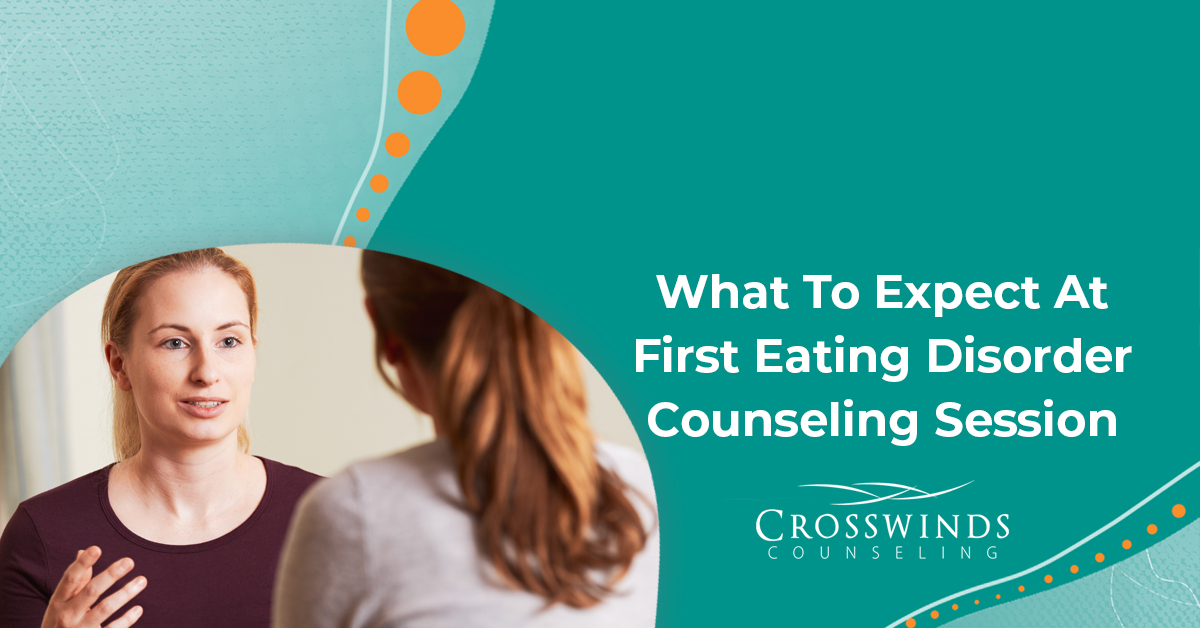
Your First Counseling Session: Meeting the Therapist
Beginning a new relationship can be challenging, especially in a therapeutic setting where an individual may be sharing vulnerable information in the first meeting. Often individuals are unsure what to expect, how to act, what/how much to say or not to say; the unknown can create a lot of anxiety and worry. Knowing what to expect in the first therapy session can be helpful to alleviate some of the stress and anxiety.
The first session of an eating disorder counseling session will vary depending on the therapist and client combination; however, there are similarities that will likely occur. Initially, the therapist will introduce him/herself and may provide you with information about his/her training, license/supervisors (if applicable), contact information, confidentiality, and your rights. If you have any questions about any of this, be sure to ask. After the therapist provides information, he/she will likely begin asking you questions to better get to know you. Some questions may include:
- How did you hear about our agency/practice?
- General information:
- Contact information
- Are you employed or a student? How is that going?
- What are your hobbies/interests?
- Have you ever been in therapy before?
- What led you to seek counseling services?
Discovering the Root of Behaviors
After collecting general information, the therapist will likely begin asking more specific questions about your eating behaviors. Many times, individuals may have never said these things out loud and/or may carry a lot of shame about their behaviors. Even if it is difficult and scary, try your best to answer the questions honestly and thoroughly. Some questions/topics may include:
- Describe your eating behaviors. What’s a typical day of eating look like?
- Do you restrict your food intake (i.e., not eat when you’re hungry, not eat until you’re full, or not eat certain foods or food groups)? How often?
- Do you eat when you’re not hungry? How much and how often?
- Do you have any ritualistic behaviors around cooking or eating?
- Do you experience any stress/anxiety when eating with others or eating foods not prepared by you?
- Do you try to compensate after you’ve eaten (e.g., exercise/move to burn calories, vomit, take diet pills or laxatives)? How much/many? How often?
- What do you do for exercise? How long? How often?
- How long have these behaviors with food/exercise been going on?
- How do you feel about your body?
- How often do you weigh yourself?
- Have you lost/gained weight recently?
- How often do you track calories, steps/movement, weight loss/gain?
- What percentage of the day do you think/worry/obsess about food? Your weight? Your body?
- Do you feel depressed, guilty, shameful, or anxious after eating?
- How are your eating behaviors affecting your relationships/job/school?
- What comments have others made about your eating/exercise habits?
Understanding the Symptoms
These questions, along with others like them, will help the therapist get a better idea of the various types of struggles/symptoms you have experienced and are experiencing, as well as identify what types of treatments will likely be most helpful. Because eating disorders directly affect one’s physical health, the therapist may ask questions that are focused on the health of your body. These may include:
- What is your height/weight? If your weight is unknown, the therapist may ask to take a blind weight (meaning take your weight and not tell you).
- When was your last physical examination?
- Have you experienced any of these symptoms?
- Dizziness/lightheadedness
- Cold/chilled regularly
- Chronic fatigue
- Concentration/memory problems
- Stomach pains/indigestion
- Regular acid reflux
- Heart palpitations
- Vomiting blood
Custom Treatment Plans
Many times, individuals with eating disorders enter treatment due to a friend or family member’s concern. Therefore, the therapist may ask about your motivation to change your behaviors and your perception about how distressing these behaviors are to you. This information will help the therapist assess the type of treatment to use, as well as the level of care.
Depending on time, the therapist may only assess your eating disorder/disordered eating in the first session, or the therapist may ask additional questions. Topics that may be addressed include:
- Self-harm
- Suicidal and homicidal thoughts/plan/intent
- Anxiety/Phobias/Obsessions/Compulsions
- Trauma(s)/PTSD
- Depression/Mania/Mood problems
- Substance use/abuse
- Other addictive behaviors (e.g., gambling, shopping)
- Attention/Impulsivity problems
- Psychosis
- Family of origin
- Current family functioning
- Sex/Sexuality concerns
- Medications being taken
- Support systems/resources
Recommendations for Care
To end the session, the therapist will likely discuss his or her impressions and recommendations. In most cases, individuals with eating disorders will need to work with a team, often consisting of a therapist, dietitian/nutritionist with some experience treating eating disorders, physician, and/or psychiatrist. Therefore, the therapist may recommend that you meet with any or all of these professionals and provide you with referrals, if possible. Additionally, the therapist will likely provide a recommendation for the appropriate level of care. Levels of care include outpatient therapy, intensive outpatient therapy (IOP), partial hospitalization programs (PHP), residential programs, and inpatient/acute programs. The level of care recommended by the therapist will depend on the chronicity of the disorder, previous treatment sought, severity and frequency of symptoms, medical stability, your motivation for change, and current resources/support systems.
Hopefully, the therapist will end the session inviting you to ask any questions. Even if he/she does not, it is absolutely fine for you to ask questions of the therapist. This can be done at the beginning or end of the session. The National Eating Disorder Association (NEDA) provides many resources for individuals and loved ones with eating disorders.
If you or a loved one need assessment, recommendations, or treatment, contact Crosswinds today. The first step is often the hardest but can begin the journey of lasting recovery.
